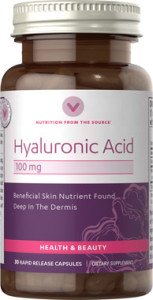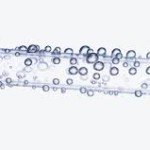 The number of side effects after injection of hyaluronic acid into the knee has been small and consists of coughing, problems with swallowing, feeling feverish, itching or stuffy nose, swelling of the eyelids, face or lips, diarrhea, acute headache or a blue or purplish patch on the skin. Other individuals may report a loss of appetite, stomachache or swelling of the knee.
The number of side effects after injection of hyaluronic acid into the knee has been small and consists of coughing, problems with swallowing, feeling feverish, itching or stuffy nose, swelling of the eyelids, face or lips, diarrhea, acute headache or a blue or purplish patch on the skin. Other individuals may report a loss of appetite, stomachache or swelling of the knee.
Oral supplementation of hyaluronic acid to promote the treatment of arthritis and skin health has also been proposed. Many studies have been conducted with the injectable form but only one or two have used the oral form of supplementation. Research into the injectable form has had consistent results but there needs to be further study in the use of oral supplementation of hyaluronic acid in order to have positive effect upon osteoarthritis.
Problems with the absorption of hyaluronic acid in the digestive tract made oral supplementation almost impossible. However, in the recent past an enzyme cleaving technique has been developed in order to break down the hyaluronic acid into a lower molecular weight that allows for use in the absorption.
Research and case study has found that hyaluronic injections may give more pain relief to patients who suffer from osteoarthritis than oral medications. Patients can report that pain is relieved for six months to a year and sometimes longer. These injections are expensive but many of today’s health insurance programs now cover them recognizing the cost effective manner in which patients and doctors are attempting to postpone surgical treatment.
References:
(1) Annals of Medicine: Serum hyaluronan as a disease marker
http://www.ncbi.nlm.nih.gov/pubmed/8811168
(2) Lung: Cigarette smoke degrades hyaluronic acid
http://www.ncbi.nlm.nih.gov/pubmed/2512457
(3) Free Radical Research Communications: Hyaluronic Acid Degradation by Ascorbic Acid and Influence of Iron
http://www.ncbi.nlm.nih.gov/pubmed/3508446
(4) Clinical Interventions in Aging: Effect of Estrogens on Skin Aging and the Potential Role of SERMs
http://www.ncbi.nlm.nih.gov/pmc/articles/PMC2685269/
| Advertisement | |
 |
|


Leave a Reply